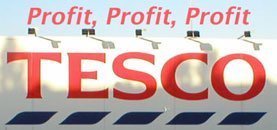The Competition Commission has been deliberating for
eighteen months. They have decided that the four big supermarket chains
(Sainsbury’s, Tesco, ASDA and Morrisons) that sell three quarters of all food
in the country offer us all plenty of ‘choice’.
- Tell that to the people of Sheringham! For ten years they
have been resisting plans for a huge town centre Tesco. Tesco made a secret
deal with North Norfolk council officials to let the development go ahead. Who
elected these officials? Who elected Tesco? The details of the deal are
shrouded by a confidentiality clause. The whole thing stinks. Even without the
whiff of corruption, supermarkets like Tesco use their long pockets to keep
challenging planning regulations and wear local councils down.
- Tell that to the dairy farmers – if you can find one. In
1995 there were 35,000 in the country. Now it’s down to 19,000 and a thousand
more leave farming every year. No wonder. The price they got from the supermarkets
for a litre of milk has gone down from 24½p to 18½p over the past ten years.
The price in the supermarkets went up 10% over the same period. As we know from
a previous Competition Commission report, this is because the supermarkets were
running a racket on milk prices.
- Tell that to the impoverished workers on plantations in
the third world. They pick the bananas British supermarkets sell.
Supermarket buyers are canny enough to bid the price right down. Who pays?
Banana Link has revealed that Fresh Del Monte sacked all 4,300 workers on its
Monte Libano planatation in Costa Rica in 1999. Then they recruited a new
workforce on reduced wages and benefits. Such was the cost-cutting success of
this blitzkrieg that they are doing it all over. Not to be outdone, Chiquita
has cut labour costs on its plantations from 5% of the total in 2004 to just 2%
in 2006
Supermarkets can sell cheaper than small independent shops
because they can buy cheaper. They use their bullying power over small farmers
and other producers. Supermarket buyers can be posted from wines to perfumes at
a moment’s notice, and don’t feel the need to know anything about either. All
they know is the bottom line. If they promote a supplier’s stuff, they have to
‘pay to play,’ for instance for a special promotion. It’s actually very
difficult to find out about these deals. The suppliers won’t talk because of a
‘climate of fear’, as Joanna Blythman points out in her book ‘Shopped’. And the
voluntary code of practice the supermarkets boast about is just a figleaf for
their bullying behaviour. The Competition Commission admits the supermarkets
have a ‘complex monopoly’ over their suppliers, but it doesn’t propose to do
anything about it.
The Church of England (itself a substantial landlord) has
recently complained that the supermarkets are ‘squeezing farmers to death’. In
one case they put vegetables on special offer and only paid the farmer £7 a
tonne instead of £14 for the duration. In effect the farmer was paying for the
shop to compete with their rivals.
The Commission also
recognises the problem when one supermarket gains a local monopoly. Then they
can and do put prices up. Bicester now sports six branches of Tesco. A resident
comments, "I probably do 95% of my shopping at Tesco, and that’s only
because I have no choice." They’re thinking of renaming the place
‘Tescotown’.
- Supermarkets
use their buying power to force down suppliers’ prices and thus the wages of
workers and living standards of small producers.
- Supermarkets
rip the heart out of local communities with out-of-town developments and by
cloning every high street.
They’re not doing anything that capitalism hasn’t always
wanted to do. But they are capitalism in its modern form. Many criticisms of
supermarkets are really criticisms of capitalism. For instance out-of town
developments mean you need a car to get there. Road-building and the carbon
emissions from cars contribute to ruining the environment. But modern
capitalism, with shift working and distances from work to home, means you
really need a car to get by. It’s capitalism that’s ruining the environment,
not just supermarkets.
What has the Commission got to say for itself? It has noted
that the supermarkets have all built up little land banks – 520 squirrelled
away. They do this for two reasons. First they can bully elected councils into
letting them march in to town. Secondly they can stop their rivals muscling in
on the territory. Idiotically the Competition Commisssion concludes that
planning restrictions should be overridden by the government. (This would
require legislation.) So the answer to supermarket power is more supermarkets!
No wonder when the Commission whitewash was published, Tesco shares soared in
relief.
A lot of people find supermarket shopping convenient. Supermarkets
are here to stay. But they’re unaccountable and they wield too much power.
Shops should not be able to effectively dictate wages and conditions, even to
workers continents away. The big supermarket chains should be taken over and
run in the interests of the people.






